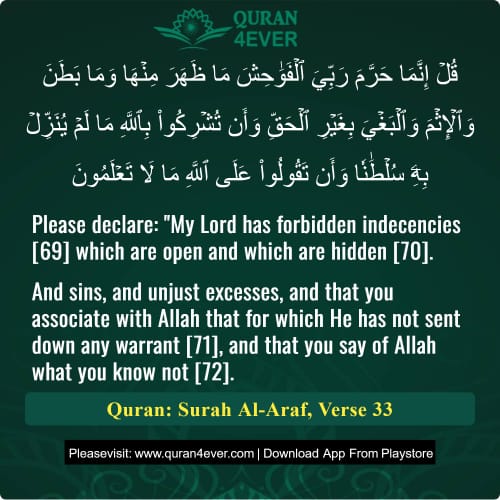
Transliteration:( Qul innamaa harrama Rabbiyal fawaahisha maa zahara minhaa wa maa batana wal isma walbaghya bighairil haqqi wa an tushrikoo billaahi maa lam yunazzil bihee sultaananw wa an taqooloo 'alal laahi maa laa ta'lamoon )
"Please declare: 'My Lord has forbidden indecencies [69] which are open and which are hidden [70], and sins, and unjust excesses, and that you associate with Allah that for which He has not sent down any warrant [71], and that you say of Allah what you know not' [72]."
In this verse, the polytheists of Arabia are being addressed, who used to circumambulate the Ka'bah (Tawaaf) in a state of nudity, and who unjustly made the Bounties of Allah Almighty unlawful for themselves.
“Indecencies” refers to sins deplored by human nature, whose moral corruption reaches the extreme—such as polytheism, infidelity, and adultery. To perform them openly is apparent indecency (e.g., open disbelief), and to commit them secretly is concealed indecency (e.g., adultery done in secret). Besides these, the word “sins” includes other forbidden acts, whether major or minor, thereby leaving no inconsistency in the meaning of the verse.
Allah Almighty has never revealed permission for any form of shirk (polytheism). Therefore, all forms of associating partners with Allah fall under this prohibition. This is not a limitation, but rather a declaration of reality—that every type of polytheism is inherently false and rejected.
From this we understand that to explain matters without knowledge, to deliver sermons, or to believe or promote concepts without basis is strictly forbidden. Doing so amounts to slander and false accusation against Allah Almighty. This part of the verse includes all such acts, making it a comprehensive prohibition against ignorance-based speech in religion.
33. Say: “(But) the things that my Lord has indeed forbidden are the Fawahish (immoral deeds) whether committed openly or secretly, and Ithm, and transgression without right, and joining partners with Allah for which He has given no authority, and saying things about Allah of which you have no knowledge.”
Imam Ahmad recorded that `Abdullah said that the Messenger of Allah said,
(None is more jealous than Allah, and this is why He prohibited Fawahish, committed openly or in secret. And none likes praise more than Allah). This was also recorded in the Two Sahihs. In the explanation of Surat Al-An`am, we explained the Fahishah that is committed openly and in secret. Allah said next,
(and Ithm, and transgression without right,) ﴿7:33﴾. As-Suddi commented, “Al-Ithm means, `disobedience’. As for unrighteous oppression, it occurs when you transgress against people without justification.” Mujahid said, “Ithm includes all types of disobedience. Allah said that the oppressor commits oppression against himself.” Therefore, the meaning of, Ithm is the sin that one commits against himself, while `oppression’ pertains to transgression against other people, and Allah prohibited both. Allah’s statement,
(and joining partners with Allah for which He has given no authority, ) prohibits calling partners with Allah in worship.
(and saying things about Allah of which you have no knowledge.) such as lies and inventions, like claiming that Allah has a son, and other evil creeds that you — O idolators — have no knowledge of. This is similar to His saying:
(So shun the abomination (worshipping) of the idols) ﴿22:30﴾.
(7:33) Tell them (O Muhammad): ‘My Lord has only forbidden indecent acts, whether overt or hidden;[24] all manner of sin;[25] wrongful transgression;[26] and [He has forbidden] that you associate with Allah in His divinity that for which He has sent down no sanction; and that you ascribe to Allah things of which you have no sure knowledge that they are from Him.’
24. For an elaboration of hidden and overt indecencies see Towards Understanding the Qur’an, vol. 11, (Surah Al-Anam, ayat 151) note 128, 131.
25. The word ithm denotes negligence, dereliction of duty. Athimah signifies the she-camel which, though capable of running at a fast pace, deliberately moves slowly. The meaning of the word, therefore, carries the idea of sin. Viewed in the context of man, the word convey’s the sense of man’s deliberate neglect of his duty to God, his failure to pursue God’s good pleasure despite his having the capacity to obey and follow Him.
26. To exceed the limits set by God and to enter an area which has been declared out of bounds for man constitute rebellion and transgression. According to this definition of baghy, the charge of rebellion will apply to all those who act according to their whims rather than in accordance with the directives of God. It is applicable to those who behave as though they are the true masters of God’s Kingdom, claiming for themselves the prerogatives of God. It also applies to all those who usurp the rights of others.
[367]- Any unlawful deed.

For a faster and smoother experience,
install our mobile app now.
Related Ayat(Verses)/Topics